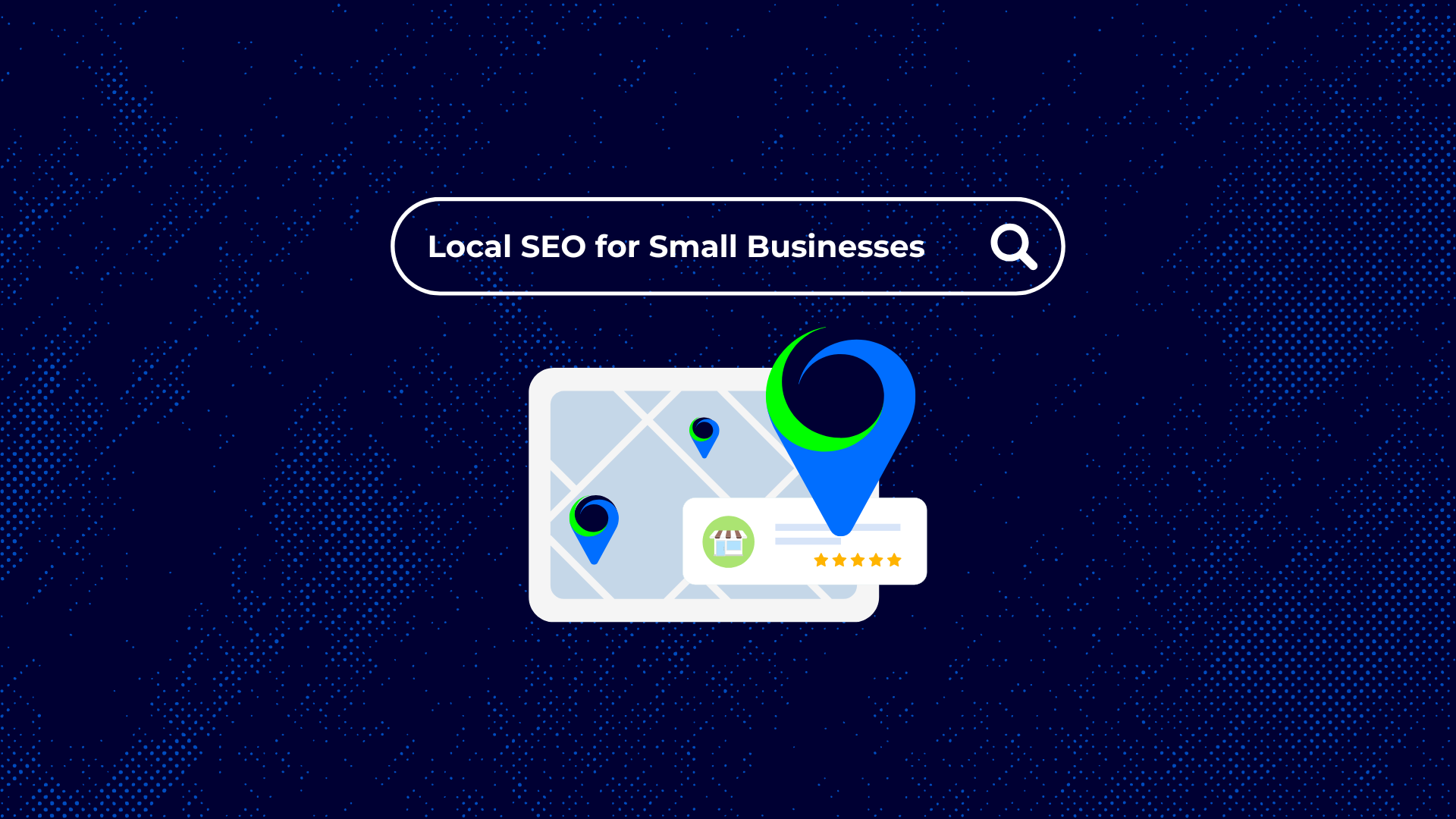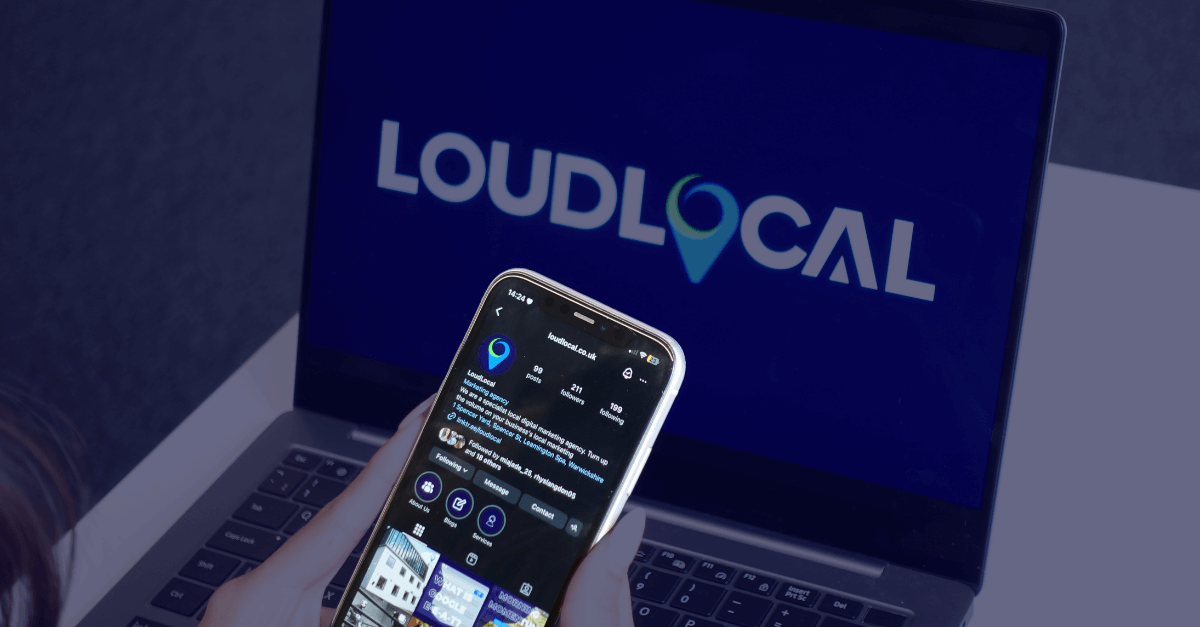How AI Impacts Our Planet & What it Means for Your Small Business
Artificial Intelligence (AI) has rapidly become a part of everyday life, from writing tools and chatbots to customer support and appointment systems....
Got a question, or need help with something?
A member of the LoudLocal team is on hand to help you.
The Brickyard, Unit 2, Queen's Rd, Kenilworth, Warwickshire, CV8 1JQ
5 Merchant Square, Paddington, London, W2 1AY
11 min read
Taya Grao-Randall
:
Aug 18, 2025 3:44:27 PM
If you’re running a small business, you’ve probably heard about PPC, pay-per-click advertising, but might not be sure how it actually works or if it’s worth the hassle. The truth is, PPC can be a powerful way to get your business noticed online fast, whether it’s on Google, Facebook, YouTube, or other platforms. For any PPC small business setup, it’s one of the most direct routes to visibility without waiting around for organic traction.
This guide breaks down what PPC is, how it compares to SEO, and why it’s a smart tool for small businesses looking to attract local customers or grow their reach. You’ll also get practical tips on setting up campaigns, avoiding common mistakes, and deciding whether to handle your ads yourself or bring in some help.
PPC isn’t just for big companies with big budgets. Done right, it puts you in control, helping your business get seen, get clicks, and get results without the usual marketing headaches. Let’s get into it.
PPC (pay-per-click) is exactly what it sounds like-you only pay when someone clicks on your ad. It’s a way to get your business in front of people online, whether that’s through Google search, YouTube, or even social media like Facebook and Instagram. For any PPC small business strategy, it’s a solid way to reach people fast without relying on slow organic growth. That’s what makes PPC advertising such a popular choice in small business marketing today.

Instead of waiting months for your website to show up on Google naturally, PPC puts you at the top straight away. You choose how much you want to spend, who you want to target, and where the ads show up. Whether you’re after local leads or trying to get your name out further afield, PPC gives you a way in, without needing to fight the big brands head-on.
It’s quick to set up, and if your ad copy hits the mark, you can start getting calls, clicks, or bookings the same day. No overthinking, no marketing degree required, just a straightforward way to get noticed online.
PPC (pay-per-click) and SEO (search engine optimisation) both get your business showing up on Google, but they do it in very different ways.
PPC is the fast-track option. You pay to appear at the top of search results, and you only get charged when someone actually clicks. It’s quick to set up, easy to control your spend, and you can turn it off anytime. If you need leads now or want to get in front of people straight away, PPC is your best bet. It’s the kind of PPC strategy that gives fast visibility, especially useful in competitive commerce sectors and for small businesses looking for fast traction.
SEO is the long game. You’re not paying for clicks, but you’re doing the work to get your site to rank naturally in Google search results. That means writing useful content, making sure your site’s set up properly, and building a bit of trust over time. It’s slower to kick in, but once it does, those clicks don’t cost you anything. That means less cost over time, but a lot more effort upfront, especially when it comes to ongoing keyword research and refining your keywords.
If you're just starting out, PPC helps you get noticed while you're building up your SEO. If you're already getting steady traffic, SEO can be worth investing in long-term to cut down on ad costs. They’re not either/or, they work best when they’re used together as part of a balanced PPC strategy and marketing plan.

PPC can be a handy tool when you’re trying to get your business in front of the right people without waiting around. It’s not magic, but when it’s done right, it can deliver real results. Here are the key benefits that make it worth a look-the real benefits of PPC that matter day to day.
You only pay when someone clicks, no wasted spend just for showing up. You’re only charged when someone actually taps on your ad. If no one clicks, you don’t pay; simple as that.
It works fast
Unlike SEO, which takes months to kick in, PPC can start bringing in traffic within a day. That’s especially helpful if you’ve just launched your website or need a quick boost during quiet periods.
You can target your exact audience
You can pick who sees your ads, whether that’s locals in your postcode, homeowners over 30, or people searching for a specific service. That means less guessing and more chance of landing customers who are actually interested. This is where smart keyword research and well-written ad copy come into play.
It’s flexible and easy to scale
You can start small, test what works, and then build it up. If you’re getting leads from a £5 a day PPC budget, you can slowly increase it without blowing your entire marketing fund. And if something’s not working, you can pause it instantly-no long-term contracts, no drama.
You stay visible in competitive markets
If you’re in a crowded space where everyone’s fighting for attention, PPC helps level the playing field. It puts your business right at the top of the page, even above the big names, as long as your ad is relevant and well-targeted.
Bottom line: PPC isn’t just for big brands with big budgets. When used properly, it gives small businesses the control to get seen, stay competitive, and drive results without the guesswork. That’s why smart PPC management makes a difference.
Google Ads – Great if people are already searching for what you offer. High intent, but it can get pricey depending on your industry. Best paired with strong keyword research and clear ad copy.
Facebook & Instagram Ads – Good for visual stuff or when you want to build awareness. You can get really specific with who sees your ad.
YouTube Ads – Works well if you’ve got a short, punchy video and want to get in front of a local audience.
Bing Ads – Not as busy as Google, but sometimes cheaper clicks.
The best option depends on what you’re selling and who you’re trying to reach. No one-size-fits-all here, your PPC strategy should match your goals and your market. Some ecommerce businesses may thrive on Meta platforms, while others do better on Google Ads.
Short answer: It can be, if it’s set up right. Google Ads lets you appear when someone’s actively searching for a service or product like yours. That’s powerful.
But if you’re not keeping an eye on your keywords, budget, and where those clicks are going, it can drain money fast. That’s why so many small businesses say pay-per-click advertising “didn’t work” for them. In reality, it is likely their campaigns were not set up or managed correctly. Working with a reputable PPC agency or investing time into understanding how to properly manage your campaigns can help to avoid the common pitfalls which can quickly lead to wasted marketing spend and disappointment.
Done properly, though, Google Ads can bring in high-quality leads. Just make sure you're not handing over cash without knowing what you’re getting back.
If your work looks good in pictures, maybe you're a landscaper, hairdresser, cake maker, or run a café, Facebook and Instagram ads can be golden. You can get your ads in front of people who live nearby, fit a certain age range, or are into things related to your business. It’s a smart way to remind people you exist while they’re scrolling.
But keep in mind, no one’s sitting on Facebook or Instagram looking to hire a plumber or book a service. They’re there to check out mates, memes, or random videos. So while your ad might get a few likes, it doesn’t always mean more bookings unless your message hits home. Still, it’s decent for getting seen and staying on people’s radar, especially with well-crafted ad copy and careful targeting.
YouTube can be solid if you’ve got something people need to see to get it, like how your service works, what makes you different, or even just showing your face to build a bit of trust. Doesn’t need to be fancy either. Even a short, honest video filmed on your phone can work if it feels real.

YouTube isn’t always about quick sales though. It’s better for building your name over time than chasing instant leads. But if you’ve got something to show and don’t mind being on camera, it can help your business stand out without breaking the bank.
Bing's the one most people forget about, but it still has a loyal crowd. Bing Ads is utilised by many small business owners with tight marketing budgets due to its cheaper average cost per click compared to Google.
Bing users also tend to be more affluent with higher household incomes, and a greater proportion browse on desktop computers rather than smartphones, which may be a targeting factor for some businesses, particularly those operating in certain B2B sectors.
It works a lot like Google Ads, and you can even copy your campaigns across. You won’t get as many clicks, but if your customers skew a bit older or you’re in a super competitive market, it’s worth a go, especially if you’re fine-tuning your PPC strategy to work across platforms.
You don’t need to be a marketing expert to run a solid PPC campaign. At its core, it’s about getting your business seen by the right people, at the right time, without wasting your budget. Here’s a step-by-step that keeps it simple:
Start with one platform that makes sense for your business. Google Ads are great if people are actively searching for what you offer, like “local roofer” or “takeaway near me.” If your work is more visual or you want to build brand awareness, Facebook or Instagram might be the better starting point. Don’t overcomplicate it. Pick one, test it, and go from there.
Decide what you actually want from the ad. More calls? More bookings? More people on your website? Having a clear goal helps you shape the ad and track whether it’s doing the job or not.
For Google Ads, you’ll need to pick keywords, the search terms people are using when they need your service. Think practical, local, and specific. For Facebook or Instagram, you’ll be targeting by things like age, location, and interests. Focus on reaching the people most likely to care about what you’re offering. Google is a great way to find long tail keywords that are easier to target and rank for

Keep it direct. Tell people what you do, who it’s for, and what to do next. If you’re a dog groomer in Leeds, say exactly that. Don’t waste words, just make it obvious and helpful. And always include a strong call to action like “Book online today” or “Call now for a free quote.” Good ad copy makes a difference.
You don’t need a massive PPC budget to get started. Even £5–£10 a day is enough to test the waters. Just make sure you’re keeping an eye on what you’re spending and what results you’re getting. If it’s not working, don’t keep throwing money at it, adjust and try again.
Use simple tools like Google Analytics or Facebook’s ad manager to see what’s working. Are people clicking? Are they getting in touch? If not, you might need to tweak your ad copy or fix the landing page. PPC works best when you treat it like a work in progress, not a set-and-forget.
Running ads can feel a bit technical at first, but once you’ve got the basics sorted, it becomes a lot more manageable. Start small, keep things straightforward, and make sure every pound you spend is pulling its weight. That’s how you make PPC work for your business.
There’s no magic number here, but you don’t need a huge PPC budget to get started. Even £50–£100 a month can go somewhere if it’s used wisely, especially with smart PPC management and clear marketing goals.
What matters more is what you’re getting for that money. If you’re spending £300 a month and getting three new customers worth £200 each, that’s a win.
Start small. Test it. Keep an eye on what’s working. Then scale it up once you’re confident it’s pulling its weight, that’s how you make your PPC strategy sustainable.

Here’s where a lot of small businesses trip up:
Broad terms like “shoes” or “cleaning services” might bring in a huge volume of clicks, but most of those people will not be anywhere near ready to buy from you. Some may be looking for something you do not even offer, or they could be in a completely different location. Every irrelevant click chips away at your budget without moving you closer to a sale. Narrowing your targeting with location-specific or intent-driven keywords keeps your spend focused on people who actually want what you sell.
Even the best ad in the world will not make up for a landing page that takes too long to load or makes visitors work to find what they are looking for. If someone clicks your ad and ends up staring at a blank screen for three seconds, they are gone. If your site’s layout is cluttered or your checkout process is complicated, you will lose them before they hit “buy.” Investing in a fast, streamlined, and mobile-friendly site is essential if you want PPC to pay off.
Without proper tracking, you are essentially spending blind. You will not know which ads are bringing in sales, which keywords are worth the investment, or where your best customers are coming from. This makes it almost impossible to make smart budget decisions. Setting up conversion tracking and monitoring analytics regularly means you can double down on what is working and cut back on what is not.
It is easy to set a campaign live and then let it run on autopilot, but if you are not checking in, you risk pouring money into ads that are not delivering results. Over time, this waste adds up. Regular reviews of your campaigns help you spot underperformers early so you can pause, tweak, or replace them before they drain your budget further.
Avoiding these doesn’t require fancy tech skills, just a bit of awareness. Make sure your ad copy makes sense, your site’s easy to use, and your PPC campaign budget’s going towards clicks that might actually turn into customers. A good PPC agency will help you avoid these early missteps if you’d rather not go it alone.
Success isn’t just clicks. It’s calls, emails, bookings, sales-whatever action matters to your business.
A good PPC advertising setup tells you what’s working and what’s not. You can see how many people saw the ad, clicked, and then actually did something. If you’re spending money but not getting results, you’ll know it, and you can change things fast. That’s the power of good PPC management and clear strategies.
With PPC, the key benefits are in the details. And once it’s dialled in, it can keep new customers rolling in while you get on with the work.
Running your own PPC campaign is possible if you have some time, patience, and a tight budget. Platforms like Google Ads and Facebook make it easy enough to get started, so you can try things out without a big upfront cost. It’s a good way to get hands-on with your PPC work and learn what connects with your audience.
But if you’re already juggling a million things running your business, adding PPC management to the list can get overwhelming. That’s where LoudLocal can help. We make sure you avoid costly mistakes and get your ads in front of the right people. From setting up campaigns and writing great ad copy to ongoing tweaks and reporting, we handle it all so you get the most out of your advertising spend.
LoudLocal offers flexible PPC management services designed for small businesses. Whether you want us to take full control or just help with parts of the process, like keyword research, ad copy, or fine-tuning your marketing strategy; we work around your needs and budget. With a bit of guidance and expert support, your PPC advertising can become a reliable, results-driven part of your overall advertising mix.

Artificial Intelligence (AI) has rapidly become a part of everyday life, from writing tools and chatbots to customer support and appointment systems....

Getting found by local customers online isn’t some magic trick, it’s about making sure your business shows up when people nearby are searching for...

Running a small business is a full-time job in itself, and finding time for social media can feel like an extra task on the list. But here’s the...

1 min read
Getting found by local customers online isn’t some magic trick, it’s about making sure your business shows up when people nearby are searching for...
.png)
Google reviews aren’t just nice to have - they’re essential for small businesses in 2025. They influence how customers find you, judge you, and...

If you’re a tradesperson, you already know how competitive it is out there. Whether you’re a plumber, electrician, builder, or landscaper, chances...